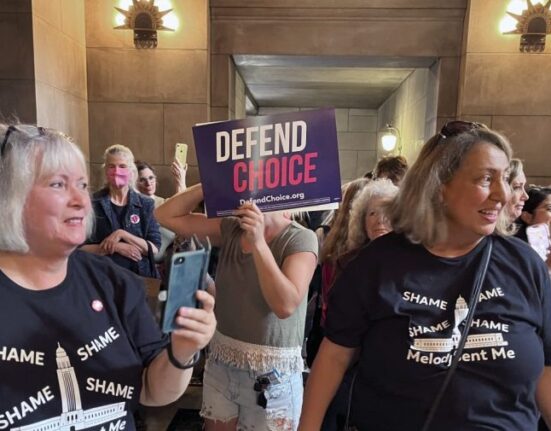When MPs vote this Friday on assisted dying, they will be trying to answer two questions folded into one. First comes the ethical choice. Is it ever permissible for one person to help someone else take their own life? Then comes the regulatory challenge. Under what conditions might that permission be granted in law?
It isn’t easy to separate those considerations. Sometimes you have to work through scenarios of implementation before arriving at a view on the prior principle. But when legislation is being drafted, the two questions must logically be answered in sequence, not in parallel. When and how are only relevant debates if the answer to the question of whether assisted dying can ever be allowed is yes.
Put the other way round, if it is your view that there are never any circumstances in which it should be legal, you don’t need a follow-up view on the severity of illness or degree of clinical and judicial oversight required before the procedure can go ahead.
There is a religious objection on the basis that human life is sacrosanct and the timing of its end is a decision for God alone. There is also a secular aversion to laws that facilitate deliberate killing, even in mercy’s name. Some argue it is inherently decivilising to put such a power on the statute book and that no safeguard exists sufficient to prevent such a power being abused. In those cases, the argument about optimal regulatory frameworks is over before it has begun.
My own view is that a person of sound mind, facing a certain and harrowing death, has the right to choose a gentler path to the grave. It is not necessarily a crime to help that person complete the journey. That belief then opens up the second set of considerations: the step from “whether” to “how”.
On that point, I am persuaded that the regime of safeguards contained in Kim Leadbeater’s draft law – stringent by international standards – do not license coercion, nor would they make a consumer commodity of death, as opponents of the bill warn it might. There is no international evidence of epidemic bullying and guilt-tripping people into euthanasia. I am not convinced that systems designed to give terminally ill people agency to die with dignity will be exploited by a hitherto unobserved mass of callous, impatient, venal relatives.
But the risk cannot be reduced to zero. It can only be minimised and weighed against potential benefits, for which the evidence base is strong. It is the testimony of people who don’t want a protracted, agonising death and of those who wish their deceased loved ones could have been spared one.
Critics of the Leadbeater bill rarely say what further safeguards would shift the balance of risk to reward enough to satisfy them. For the most vocal among them, the honest answer would be none. The regulations that interest them are not the ones in the bill itself, but negligently laxer ones projected on to the bottom of a slope made slippery with worst-case hypotheticals.
That rhetorical device is working. Sufficient doubts have been sown to make many MPs who are amenable to reform in theory reluctant to endorse a sensible reform in practice. But defeat of the bill won’t be read as an instruction to rethink and draft more robust protections. It will be a victory for the no, never camp, which is out of tune with public opinion and probably isn’t the majority view in the Commons.
This conflation – the blurring of lines between ethical fundamentals and practical measures – is, unfortunately, an inevitable function of the process.
I can’t blame Leadbeater for seizing the opportunity afforded her by winning the lottery that decides which backbenchers get to propose private members’ bills. It is easy to see why the government leapt on this happenstance to facilitate a vote on something that deserves parliamentary consideration but which wasn’t in Labour’s manifesto. There is a tradition of private members’ bills serving as a vehicle for social reform, as with decriminalising abortion and homosexuality in the 1960s.
More recent practice has put the heft of government into preparing the legislation – on same-sex marriage, for example – while still allowing MPs a free vote. That model might have allowed for more pre-legislative consultation. The Leadbeater bill is sturdily drafted but it landed suddenly, on hard ground that might have been better prepared if an independent commission, under an expert chair, had collated medical evidence and lessons from abroad.
But the big opportunity being missed is the deployment of innovations in public consultation, often grouped under the rubric of deliberative democracy. These are the citizens’ juries and assemblies that have been convened in other countries and by some local authorities in Britain to work through contentious issues in ways that promote practical dialogue over entrenched recrimination.
The island of Jersey had convened a citizens’ jury in 2021 before passing assisted dying laws earlier this year. When Ireland voted for same-sex marriage in 2015 and legal abortion in 2018, both ballots emerged from forums of public consultation. They didn’t reach consensus, but they laid foundations of mutual comprehension between rival sides in the argument. That sequence is credited with helping avoid the kind of fissile polarisation inflicted on Britain by the Brexit referendum.
Used properly, these tools don’t rival parliamentary representation or ministerial discretion. Governments still make decisions, and MPs still debate and scrutinise the law. But no one involved in those processes believes they enjoy public confidence. The civic fibres that should bind an electorate to its democratic institutions have atrophied in a climate of cynicism and mistrust.
Where that connective tissue is frayed bare, populism fills the gap. Without new ways to navigate hard policy choices, enriching our collective capacity to talk about trade-offs and cost-benefit equations, politicians who govern in deference to facts and evidence will keep losing to demagogues campaigning on vibes of easy salvation.
Willingness to recognise complexity and amenability to compromise are not freakish traits of a rarefied technocratic elite. They are normal, everyday human characteristics that a healthier democracy would routinely engage. The debate around assisted dying was a chance to show how that might work. It isn’t too late. MPs could pass the bill at second reading, recognising that change is needed, but amend it in committee to mandate a process of public deliberation on the contours of reform.
Or they could just carry on as if the ritual performance of debate in the theatre of parliament is all the engagement the public needs. But they shouldn’t then act surprised when the audience switches off.













